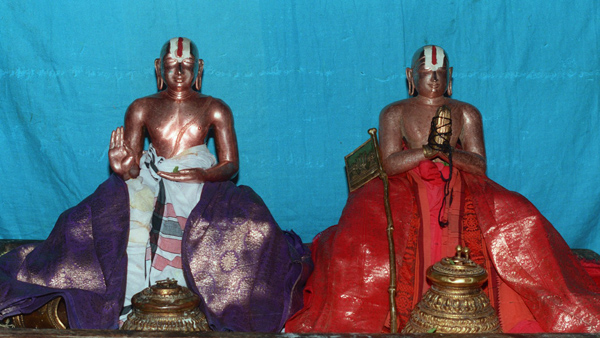SrI: SrImathE SatakOpAya nama: SrImathE rAmAnujAya nama: SrImath varavaramunayE nama:

piLLai lOkAchAryar and maNavALa mAmunigaL (SrIperumbUthUr)
e-book – https://1drv.ms/b/s!AnOSadexHn4jhVruzzXofr4BfrP7?e=q3fVrh
upadhEsa raththinamAlai is a wonderful thamizh prabandham (divine composition) mercifully composed by our maNavALa mAmunigaL, who is a viSadhavAk SikhAmaNi (one with a radiant speech and who is like a jewel in the crown). This is a wonderful creation which explains in a nutshell, the essence of piLLai lOkAchAryar’s (one of our preceptors) divine work SrI vachana bhUshaNam. The essence of SrI vachana bhUshaNam is AchArya abimAnamE uththArakam (affection shown by one’s AchArya (teacher) is the one which will uplift the disciple). When a disciple goes to an AchArya, he shows mercy on the disciple and uplifts him. This is celebrated as the greatest and simplest means by our preceptors. The world jIvanam refers to nourishing and protecting one’s physical form (body). ujjIvanam refers to the path which is apt for the AthmA (soul). The ultimate benefit which is apt for the AthmA’s svarUpam (nature) is to attain emperumAn (supreme entity) in paramapadham (SrIvaikuNtam), be amidst the group of his followers and carry out servitude to him.
When the inner meanings of a grantham (composition) are explained, it is normal to explain the meanings of matters related to it. In the same way, mAmunigaL (1) offers salutations to his AchArya [thiruvAimozhippiLLai]; (2) gives the chronological incarnations of AzhwArs and the divine places where they incarnated; (3) gives an introduction to the AchAryas (preceptors) who came in the path shown by AzhwArs; (4) explains the greatness of rAmAnuja, who is considered as the torchbearer among the AchAryas, in uplifting the entire world; (5) explains the glory of namperumAL (the uthsava idol at SrIrangam) in naming this sampradhAyam (system of traditional beliefs) as emperumAnAr dhariSanam (the philosophy of emperumAnAr, rAmAnuja) since namperumAL wanted to extol rAmAnuja; (6) lists out the commentaries for thiruvAimozhi [a divine composition mercifully given by nammAzhwAr] which is the root for our philosophy; (7) explains the glory of nampiLLai (one of our preceptors); (8) explains the greatness of SrI vachana bhUshaNam which was mercifully composed by piLLai lOkAchAryar, the divine son of vadakkuth thiruvIdhip piLLai, its inner meanings, the glories of those who followed this divine work and (9) finally explains that we should keep in mind every day, the wisdom of our preceptors as well as their anushtAnams (activities in line with vEdhas) and completes the prabandham saying that those who live this way will be worthy of the divine mercy of emperumAnAr, the great sage, who incarnated for uplifting all the people.
At the end of the prabandham a single pAsuram (hymn) composed by eRumbiyappA [mAmunigaL’s disciple] is also recited with the rest. In this, eRumbiyappA says that those who have a connection with the divine feet of mAmunigaL will surely be accepted by emperumAn.
This is an attempt to provide a simple explanation to this great prabandham. This is being carried out with the commentary given by piLLai lOkam jIyar.
- thaniyan
- pAsurams 1 to 3
- pAsurams 4 to 6
- pAsurams 7 to 9
- pAsurams 10 and 11
- pAsurams 12 and 13
- pAsurams 14 and 15
- pAsurams 16 to 18
- pAsurams 19 and 20
- pAsurams 21 and 22
- pAsurams 23 and 24
- pAsurams 25 and 26
- pAsurams 27 and 28
- pAsurams 29 and 30
- pAsurams 31 to 33
- pAsurams 34 and 35
- pAsurams 36 and 37
- pAsurams 38 to 40
- pAsurams 41 to 43
- pAsurams 44 and 45
- pAsurams 46 and 47
- pAsurams 48 and 49
- pAsuram 50
- pAsurams 51 and 52
- pAsurams 53 and 54
- pAsurams 55 and 56
- pAsurams 57 to 59
- pAsurams 60 and 61
- pAsurams 62 and 63
- pAsurams 64 and 65
- pAsuram 66
- pAsurams 67 to 69
- pAsurams 70 to 72
- pAsuram 73 and concluding pAsuram of eRumbi appA
Source: http://divyaprabandham.koyil.org/index.php/2019/09/upadhesa-raththina-malai-tamil/
adiyEn krishNa rAmAnuja dhAsan
archived in http://divyaprabandham.koyil.org
pramEyam (goal) – http://koyil.org
pramANam (scriptures) – http://granthams.koyil.org
pramAthA (preceptors) – http://acharyas.koyil.org
SrIvaishNava education/kids portal – http://pillai.koyil.org